Beaten up by China for going fishing
- Published
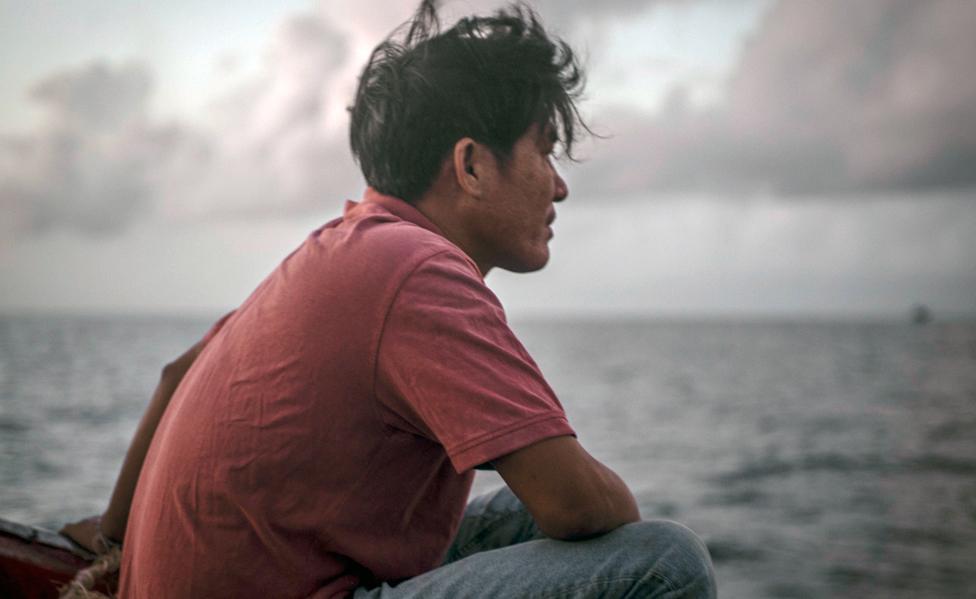
Vietnamese fishermen say they are being attacked by China with increasing regularity. Their boats have been rammed, equipment broken and crewmen beaten up. Vietnam accuses Beijing of trying to force them out of waters in the South China Sea where their families have fished for generations.
As the breaking dawn casts a red-orange rim around the horizon of the South China Sea, Vo Van Giau kneels on the front deck of the fishing boat and locks his hands behind his head.
"That is what they made me do," he says, pushing his head hard down. "Then they beat me with steel rods and a hammer like this." He pulls a heavy wooden mallet from a bundle of fishing equipment and strikes himself softly on his shoulders and against his sides.
Fisherman Vo Van Giau: "They beat us with our fishing equipment"
Van Giau, who is 42, shows photographs of his injuries on his phone - huge, welling bruises and cuts. The attack lasted well over an hour and he needed hospital treatment.
He tells how, in July, Chinese coastguards rammed into his wooden boat - badly damaging it - while he was fishing in waters near the Paracel Islands. They lie about 175 miles (280km) off the Vietnamese mainland - roughly the same distance they are from Chinese island province of Hainan.
Van Giau lives on the small island of Ly Son - in the past year Vietnam says almost half of the island's boats fishing in this area have come under attack from the Chinese.

"My father fished these waters, my grandfather and my great-grandfather. From ancient times they have belonged to Vietnam. Now China has claimed them and invaded them illegally," says Van Giau.
This boat is owned by a friend, 62-year-old Vo Van Chuc who has had fishing nets and tackle, together with his catch of fish, stolen by the Chinese coastguard. "All of us are threatened every time we go out," says Van Chuc.
The boat is small and cramped and cluttered. A faded Vietnamese flag flies on a mast at the front and another above the wheelhouse. Inside there is no state-of-the-art marine equipment, just a radio, a compass and old, rusting dials.
The two fishermen and four young deckhands all come from Ly Son, 20 miles (32km) from the Vietnamese mainland. It is a dusty, underdeveloped community which only got a reliable electricity supply last year and for generations has lived from fishing.
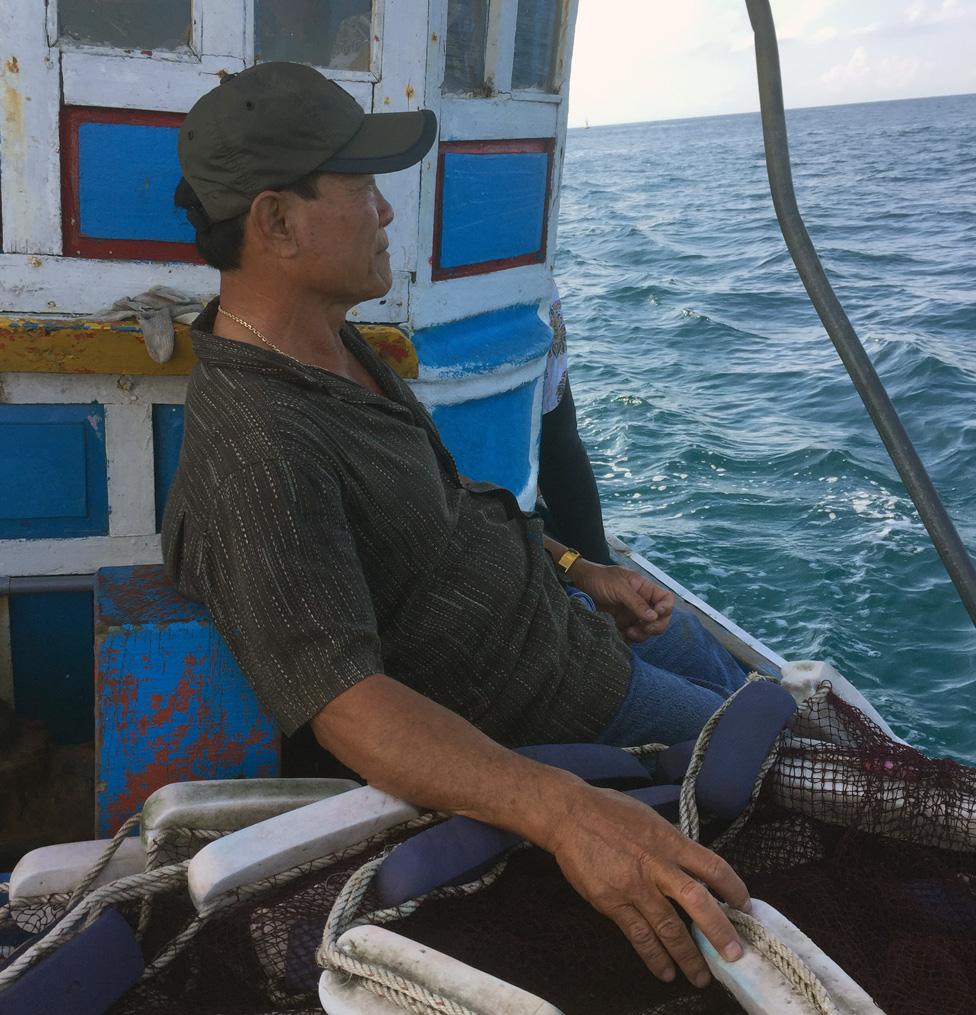
Ly Son fishermen have become so crucial to Vietnam's national security that they are exempt from the country's compulsory military service. Their job is to keep working far out at sea and face down the Chinese threat against Vietnamese territory.
More and more are coming into head-on confrontation with the Chinese coastguard and navy.
The island lies on the edge of what is referred to in Vietnam as the Cow's Tongue because of the horseshoe shaped area of some 90% of the South China Sea that Beijing says is its sovereign territory.
The claim is not new. But in 2009 it lodged it formally with the United Nations. Since then it has tried to reinforce its case by building runways and ports on newly created islands in the Spratly archipelago where, in 1988, it attacked and occupied one of Vietnam's garrisoned islands with heavy loss of life.
It seized the Paracel Islands in two separate military operations in 1956 and 1974, and in 2012 reinforced its control by announcing the new Sansha prefecture there - a civilian administration which is part of Hainan province.
These waters between Vietnam and the Paracels are what Ly Son islanders call their traditional fishing grounds. Beijing has never published the exact geographical coordinates of the area it claims as its own, so the Vietnamese crews have no idea how far they can go without running into a Chinese naval or coastguard vessel.
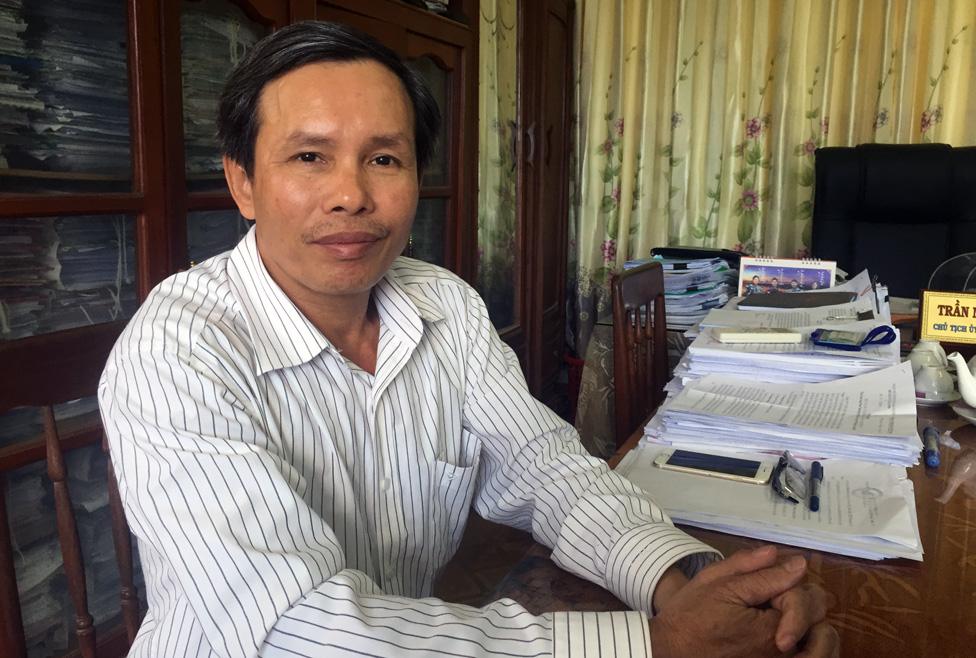
Tran Ngoc Nguyen is the chairman of the Ly Son island district
"Vietnamese fishermen do not scare easily," says Tran Ngoc Nguyen, chairman of the Ly Son island district. Drawing the line of the Cow's Tongue with a blue marker pen on the map on his desk, he brushes it right next to Ly Son island. "We will keep fishing in those waters in the same numbers. It is normal that we face attack from the Chinese and it is getting worse. Of the 50 boats that went into that area this year 20 were attacked."
Close to Ngoc Nguyen's shabby office is a statue of three historic sentinel-like figures revered for protecting Vietnamese fishermen at sea over the centuries. Next to it is a small museum, filled with old maps from Britain, the United States and China itself. The idea is to show that none of these maps contain a reference to China's control of the South China Sea.
The Ly Son fishermen are foot soldiers of this dispute, tasked by the government to make a show of resisting China's claim. Vietnam is also replenishing its outdated navy with submarines and warships from Russia, while steadily increasing its military contacts with the United States, Japan, Britain and other Western governments.
"There is more intelligence sharing, so the Vietnamese have a better awareness of what the Chinese are doing," says Murray Heibert of the Centre for Strategic and International studies in Washington DC. "China's actions are definitely pushing Hanoi closer to America."
The South China Sea, a crucial trade route for oil and freight, is fast becoming a test of wills between Washington and Beijing. More than 60% of Japan's, South Korea's and Taiwan's energy supplies come along this route.
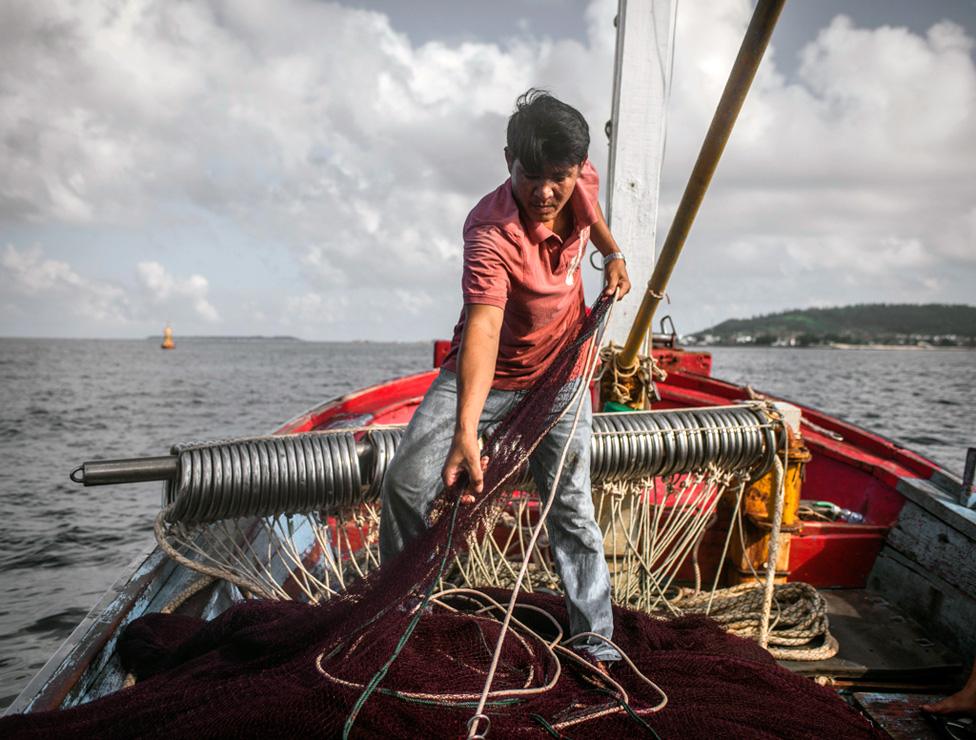
For its part, China says it has the right to enforce measures against boats that have illegally entered its waters. A foreign ministry spokesperson would not address directly the Vietnamese allegation of the fishing boat attacks but said that China "stays unswervingly committed to peacefully resolving relevant disputes with countries directly concerned".
So far China has implemented an annual May to August fishing ban, arguing that it safeguards fish stocks, which Vietnam does not recognise. It is significant that Van Giau was beaten up in July while it was in force - although other attacks have been reported throughout the year.
In Hanoi exhibits at the Military History Museum of captured helicopters, battle plans and crashed warplanes underline the point that Vietnam is not a country to be messed with. In its modern history it has taken on three of the five permanent members of the UN Security Council and won each time - against France in 1954, the United States in 1975 and China in 1979.
On Ly Son, Van Giau, Van Chuc and others live in a close-knit community. At a gathering of three generations at Van Chuc's sparsely furnished but spotlessly clean house, it is far from clear how long fishing will remain the bedrock of island life.
Vo Van Giau has a 17-year-old son and two daughters aged 13 and eight. So far they have expressed no enthusiasm to follow their father's career. Vo Van Chuc's 36-year-old son, Phan Thi Hue, began work as a fisherman but has now gone into tourism while his wife runs a shoe shop. "Fishing is too hard with very little money," he says. "It is also becoming dangerous."
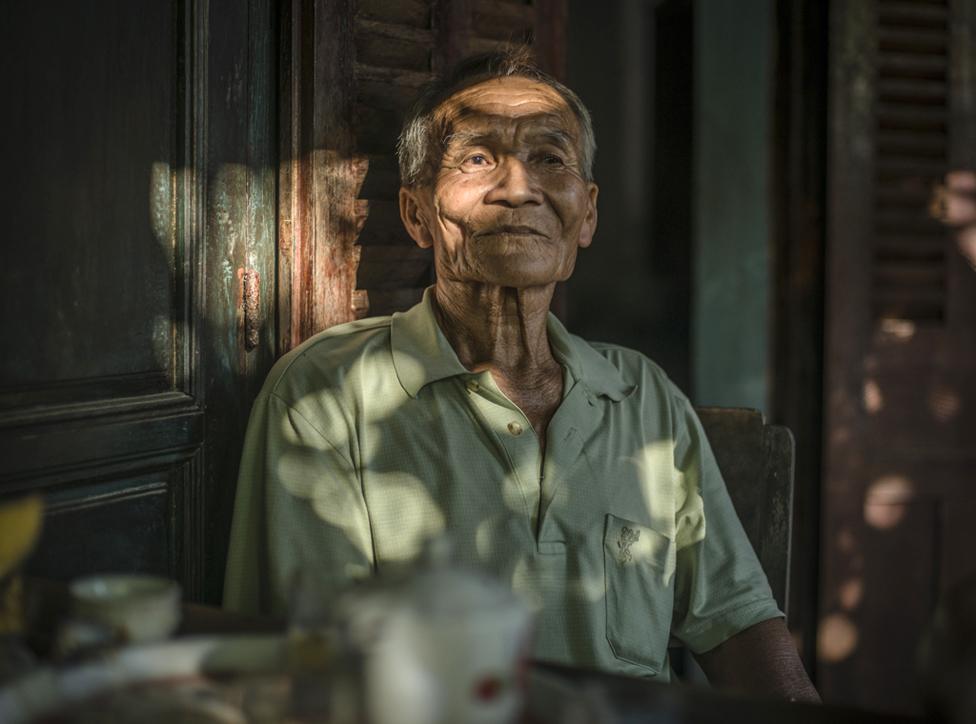
Among the group is 81-year-old Phan Din who still crews on fishing boats. He has lived through all the conflicts of Vietnam's modern history and fully intends to keep fishing.
"We are used to having enemies," he says. "But we are clever people. I began work under the French colonialists as a driver for their officers. I had to take them to the beach with their mistresses and make sure their wives didn't find out."
As for Vo Van Giau, he has no plans to stop fishing. With his own boat repaired he will head out again to disputed waters. "We need to fish without this threat and we hope diplomatic negotiations quickly bring us peace," he says. "But we want the Chinese to stop attacking us."
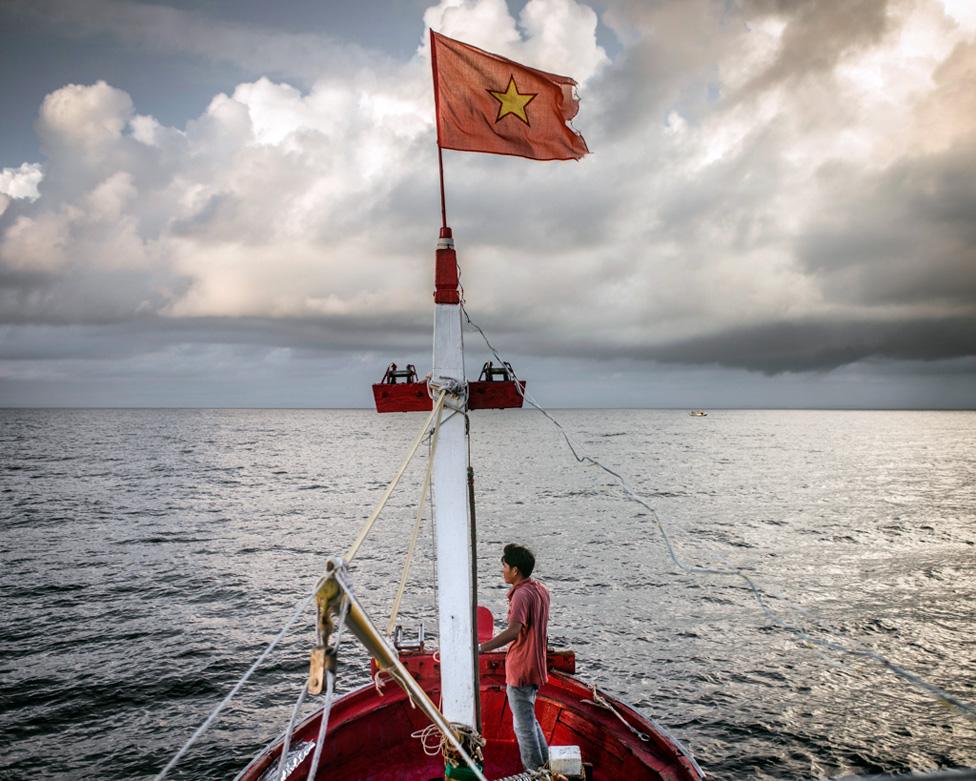

More from the Magazine
In 2014 the BBC's Rupert Wingfield-Hayes travelled across the South China Sea in a fishing boat and became the first journalist to observe close-up how China is constructing new islands on coral reefs. In December he returned to the area in a small aircraft - provoking a furious response from the Chinese Navy.

Subscribe to the BBC News Magazine's email newsletter to get articles sent to your inbox.